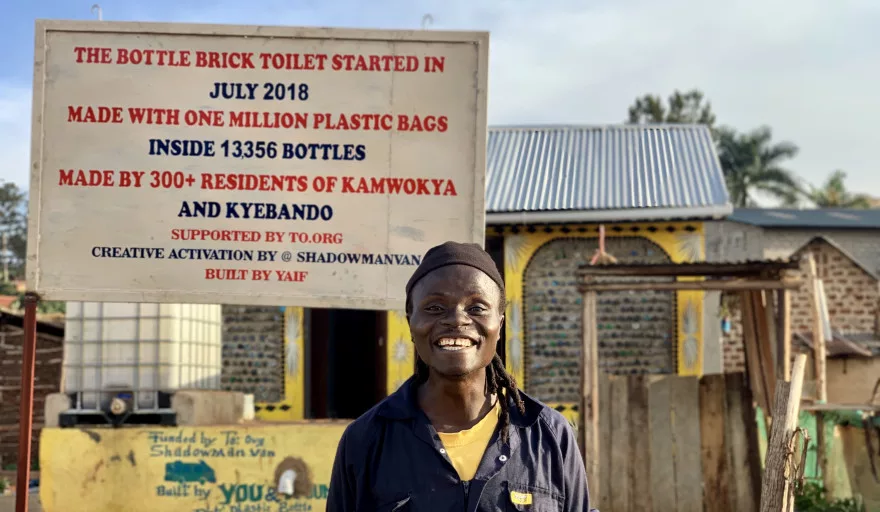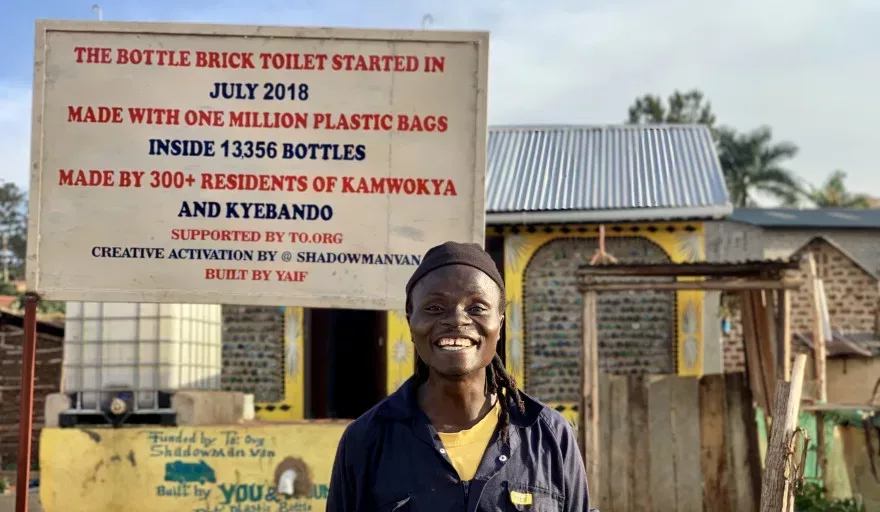
Arieh and Nachson Mimran, Co-Founders of To.org, explain how different forms of investment can be used as a catalyst for change
Writer: Dani Redd
“The world is teeming with amazing people doing incredible things. But sometimes they’re forgotten or just need a little bit of help. Ultimately, it’s a story of all of us as a collective, of doing what’s right in the smartest way possible,” says Arieh Mimran.
Writer: Dani Redd
“The world is teeming with amazing people doing incredible things. But sometimes they’re forgotten or just need a little bit of help. Ultimately, it’s a story of all of us as a collective, of doing what’s right in the smartest way possible,” says Arieh Mimran.
I’m on a video call with Arieh and his brother Nachson, and we’re discussing To.org, their latest venture. Part ethical investment fund and part creative activism project, underpinned by both hard data and altruistic spirituality, To.org will take what you know about venture capitalism and turn it on its head.
Giving back
The brothers grew up in Senegal and Switzerland, and believe the stark contrast between the two countries was a catalyst for their activism.
“There were so many things about Senegal that we really wished we could see in Switzerland,” Arieh tells me. “Like a really strong sense of community. Homelessness is quite rare, as there’s always a relative who will take you in.
“When I first saw homeless people in Bern, the capital city of Switzerland, I was quite surprised because I wasn’t used to seeing them in Senegal.”
Arieh recalls that as he grew older and became more involved in the business world, he found that African businesses and NGOs had a strong meaning and vital purpose compared to western countries, where projects felt less necessary, with money being funnelled into the wrong places.
Both Mimran brothers, throughout the call, repeatedly acknowledge their privilege. They emphasise that one of the most important things about being in their position is that they can give back to local communities.
“If we have food on our plates and access to education, then first of all, everyone else should have the same right. And secondly, anything above that we’d love to give back,” Arieh explains.
As a teenager, Arieh began to develop an interest in microfinance and sustainable economics. Meanwhile Nachson, seven years older, had been involved in the family business from a young age. Alongside learning about operating in frontier markets, he had become interested in the best way to run a business to maximise its socio-economic effects in a way best benefitting the local community.
The two brothers were beginning to discuss how best to combine their ideals and experience in a partnership when their mother passed away unexpectedly. This instilled in them a sense of urgency, and a desire to make their lives matter.
“We want to wake up every day to serve others in the most thoughtful and sophisticated of ways,” says Arieh. “Not just in the ways that look the best, but in the most data-driven and in the most logical of ways.”
Nachson explains that the business is not just underpinned by hard data, but is also guided by the concept of tikkun olam, a philosophical principle found in the kabbalah.
“Tikkun olam is a principle that many enlightened souls live by, which is that we’ve inherited quite a chaotic and dysfunctional world, and if we aren’t in the 30 percent of the population that live in poverty then we have the ability to close every day with a serious review of the acts of tikkun, which are the acts that we’ve done through the day to help repair this chaotic situation that we’ve inherited,” he says.
“This is something that was instilled in us by our mother. When you’re younger an act of tikkun is hugging a kid who is being bullied at school. And as we started growing into young adults, acts of tikkun started taking on more global implications, and involving more collective expertise focussed on social issues.”
So the brothers set up To.org, which exists to help accelerate the important work other businesses and individuals are doing in the fields of education reform, sustainability, agriculture, health and much more.
“This is the decade that matters,” Nachson explains. “We have less than 10 years to change the trajectory we’re on and we won’t sleep until we do that.”
Venturing solutions
The brothers have thought long and hard about the best way they can mobilise To.org to give back. While they acknowledge the importance of financial capital, they also stress that donating money to a project or situation is not always the best, or only, way to help. The remit of To.org therefore extends beyond simply functioning as an investment fund – it also helps facilitate collaborations, engages in humanitarian projects and helps provide creative branding and innovative solutions.
Each project is carefully evaluated by the brothers before they decide to take it on. But their motives are not solely pecuniary.
“Financial return is very important, especially if you are trying to compete in a highly capitalistic world,” Arieh says. “But after six years of work we finally defined six different types of return that we care about. I’ll split them into two categories – the first is more straightforward for the sustainable investor and that’s financial return, social return and environmental return.
“The second category is a little more esoteric. We realised that a lot of people make financial decisions because they want to learn, and at To.org, we’re a young company who believes that educational return is very important. The fifth type of return is more brand or narrative-based – we want to take on projects that create a narrative which others want to be a part of.
“And then, finally, we look at spiritual return. We define this as: “if we fast forward 50 or 60 years, and Nachson or I or any of the other decision-makers are on their deathbeds, did we make the right decision, at the right time, for the right reason?”
Some of the ventures that To.org is proudest of supporting include mPharma – a business dedicated to making medicines safe, accessible and affordable to everyone in Africa – and Sokowatch, a business linking small suppliers to the digital economy to improve African supply chains.
Creative activism
While Arieh is heavily involved in the venture vertical of the business, Nachson spearheads the ‘To create’ vertical. He has always been interested in how vital information can be communicated in a way that engages people.
“Not everyone has a response to an infographic,” he explains. “And this is where culture has a really important role to play.”
A pivotal moment in To.org’s thought about the importance of creativity came in 2016, when the Liberian President Ellen Johnson Sirleaf was trying to pass a progressive education reform act which involved inviting private sector operators to partner with the government – something she received backlash for.
The brothers connected their friend, the singer Akon – a philanthropist interested in electrification – with the Liberian Ministry of Education and private educational operatives, and together they established the Light to Learn initiative, which uses clean solar energy to power classrooms. The initiative kicked off with a high-profile talent show that sparked interest across the continent.
“What was interesting here was the ability to connect seemingly unconnectable dots – an African influencer who happens to be in solar energy, a female African president with a cohort of private operators – and create this synergy,” Nachson explains. “This was the beginning of our vertical called ‘To Create’: bringing together a collective of people we now call creative activists from our network to crack certain briefs.
“‘To Create’ has a service where we help vital ventures with their brand strategy and design. But we go beyond that and also think of art, not just as an object but a system or tool that helps connect the 0.1 percent of the world with the 30 percent who live in poverty.”
Nachson proceeds to outline an example, holding up a plastic bottle that has been stuffed with around 50 discarded carrier bags, which gives it a density that allows it to be used in construction projects.
“We launched a movement in a Ugandan slum where we had more than 500 people, including women, children not in school and unemployed youth, and had them make these bottle bricks,” he continues. “We purchased each one for 20 cents and used them to build a public toilet in the slum.
“We used 13,356 bottle bricks, and the result is more like an art piece or a monument than a toilet. So it doesn’t just provide a solution to inadequate sanitation, it provides this mindset that anything is possible.”
Both Nachson and Arieh want to diminish their own role in the projects they mention, highlighting instead the innovative ideas of the community around them.
“We are just one tiny little piece of the puzzle and our most valuable asset is the trust that this collection of misfits has in our ability to do things differently,” Nachson says.
However, it is clear to me that Arieh and Nachson have played a vital role in inciting a movement they hope will challenge views of capitalism, and become the status quo.
In a world that has seen some alarming shifts in the past couple of decades, ranging from climate change to the coronavirus pandemic, it is clear we need more organisations like To.org.
Creative case studies
THE GREAT GREEN WALL: To.org supports this pan-African initiative to build a ‘wall’ of trees from Senegal to Eritrea to help combat desertification and provide livelihood in rural areas (through farming and agroforestry) which are seeing exodus. It has already planted over 60,000 cashew nut trees and mango trees at the base of the wall in Senegal. It functions as a hybrid approach to land degradation, carbon offsetting and economics, while also challenging the symbolism of the wall as something that divides cultures.
SHADOWMAN VAN: One of ‘To Create’s’ flagship projects began with an art piece by Richard Hambleton – a graffitied 1970s van. To.org has parked the van outside the Mimran brothers’ hotel in Gstaad (The Alpina) and established a network of similar vans across the communities where it operates. The vans are ‘portals’, or meeting rooms where people across the world can video conference and interact with each other. For example, an architect in a refugee camp could Skype with an architect on holiday in Gstaad at The Alpina to discuss ideas and network.




























